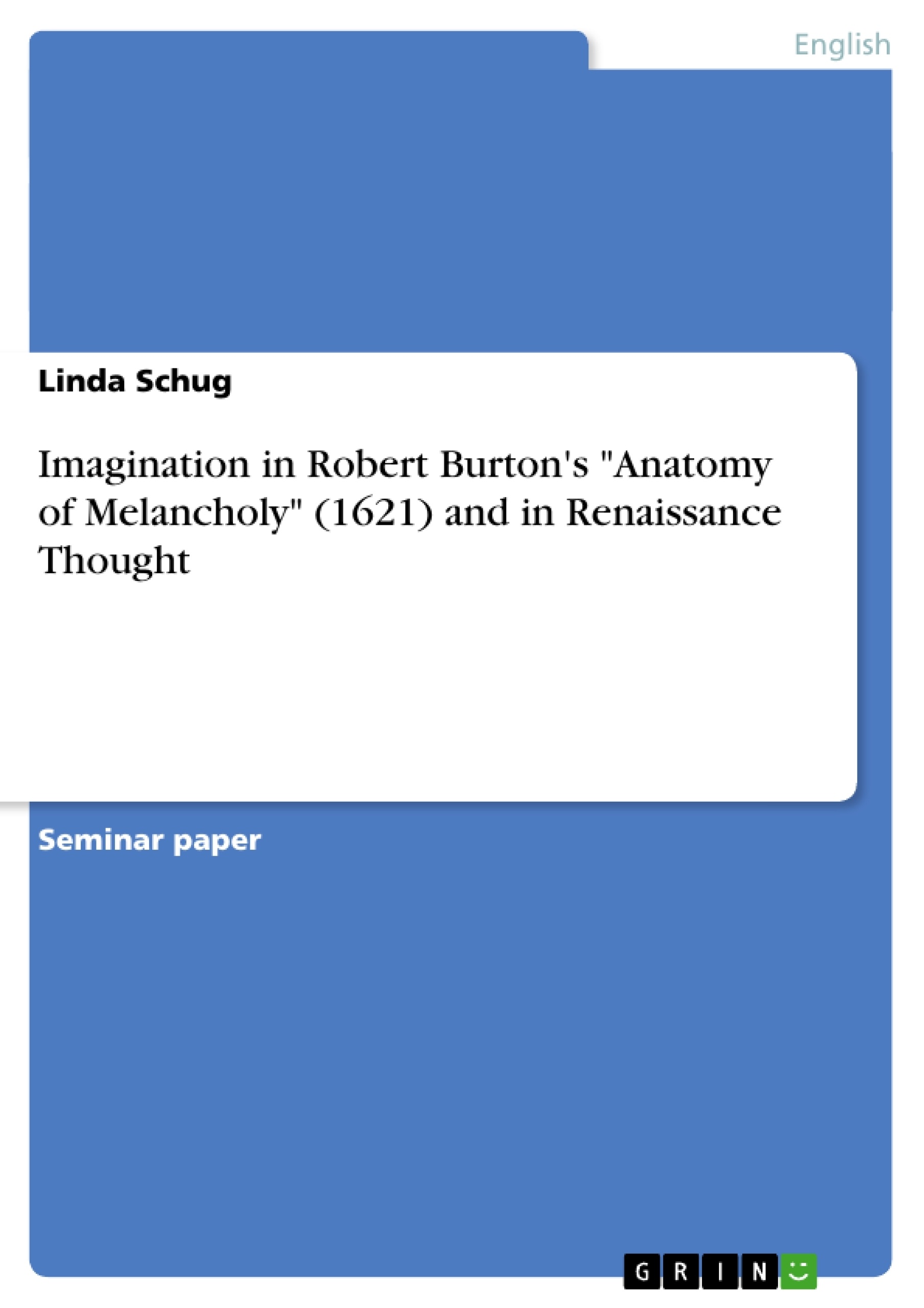The word 'imagination' has and had various meanings as this extract from The Oxford English Dictionary illustrates:
1. The action of imagining, or forming a mental concept of what is not actually present to the senses [...]; the result of this process, a mental image or idea (often with implication that the conception does not correspond to the reality of things, hence freq. vain (false, etc.) imagination [...]
2. The mental consideration of actions or events not yet in existence a. Scheming or devising; a device, contrivance, plan, scheme, plot, a fancyful project [...] b. Impression as to what is likely; expectation, anticipation.
[...]
These are the definitions that existed in the Renaissance period. But as I am going to show in my essay with the example of Robert Burton's The Anatomy of Melancholy (1621), imagination played a more influential role during that period and was believed to have and had a big impact on different spheres of life. Of course, there was no homogeneous opinion about its influence.
As Katherine Park notes, the debate over the force of imagination 'was complicated by the fact that the most ardent defenders of the power of imagination included both the most credulous - writers like Paracelsus who would believe any story - as well as the least superstitious - writers like Pomponazzi and Montaigne for whom the imagination provided a credible and natural explanation for some of the more far-fetched claims of popular magic and religion.' (Huet 14)
So I will point out to what extent Burton's ideas about it correspond to the views of his contemporaries and also how far they are more influenced by tradition. I am going to start with a passage about the contemporary development of the scientific method and an introduction to the circulating thoughts about imagination. Based on this, I will show how some trends of thinking are reflected and I will take a closer look at the contexts in which imagination or fancy appear in The Anatomy of Melancholy. Apart from the part entitled "Of the Force of Imagination", this mental power resonates in many other sections, too. It is connected to the medical sphere where it influences the unborn child and the health, as well as to dreams and to the supernatural - not just in the sense that demons and witches are the monstrous products of fantasy. They were also thought to have a strong influence on the imagination itself.
Inhaltsverzeichnis (Table of Contents)
- Introduction
- The Scientific Method
- In the Renaissance
- Burton's Scientific Method
- The Role of Imagination
- Imagination in the Medical Sphere
- Embryology
- Influence on Health and Body
- Imagination as Cause of Illness, Death and Transformations
- The Curing Powers of Imagination
- Imagination and Dreams
- Interaction of Imagination with the Supernatural
- Devil and his Demons
- Witches and Magicians
- Conclusion
Zielsetzung und Themenschwerpunkte (Objectives and Key Themes)
This essay examines the role of imagination in Robert Burton's The Anatomy of Melancholy (1621) and its significance within the context of Renaissance thought. It explores how Burton's understanding of imagination aligns with and diverges from contemporary views, highlighting the pervasive influence of imagination in various spheres of life, from the medical to the supernatural.
- The evolution of the scientific method during the Renaissance
- The multifaceted nature of imagination in Renaissance thought
- Imagination's impact on health, illness, and the human body
- The role of imagination in dreams and the supernatural realm
- The interplay between imagination and rational thought
Zusammenfassung der Kapitel (Chapter Summaries)
The introductory chapter delves into the changing landscape of the scientific method in the 16th and 17th centuries, tracing the shift from a reliance on traditional interpretations to a more empirical and observational approach. It also examines the complex understanding of imagination prevalent during this period.
The second chapter explores the profound influence of imagination in the medical sphere, examining its impact on embryology and its perceived capacity to both cause and cure illness. The chapter delves into how imagination was seen as a potent force shaping health and even affecting the course of life and death.
The third chapter investigates the relationship between imagination and dreams, highlighting the significance of dreams as a conduit for exploring the subconscious and the realm of fantasy.
The fourth chapter examines the intricate interaction between imagination and the supernatural, specifically focusing on the role of demons, witches, and magic in shaping and influencing imaginative perceptions.
Schlüsselwörter (Keywords)
This essay focuses on key themes such as imagination, Renaissance thought, scientific method, medical sphere, dreams, supernatural, demons, witches, and the work of Robert Burton, particularly his Anatomy of Melancholy.
- Quote paper
- Linda Schug (Author), 2003, Imagination in Robert Burton's "Anatomy of Melancholy" (1621) and in Renaissance Thought, Munich, GRIN Verlag, https://www.grin.com/document/47521



